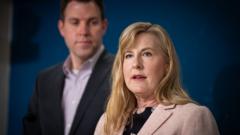Jessie Ebertz stood before a makeshift memorial in St. Paul for the slain politician Melissa Hortman and her spouse, Mark, who lost their lives at the hands of a gunman disguised as a police officer. "Minnesota has felt like a safe haven," Ebertz lamented, acknowledging that the recent tragedy has shattered the state’s cherished reputation for civility and mutual respect, often referred to as "Minnesota nice."
The shocking attack has rattled the state’s political landscape, particularly as state representative John Hoffman was also injured in the assault. The alleged assailant, Vance Boelter, was arrested after a manhunt and reportedly targeted several political figures, indicating a troubling trend in politically motivated violence within the state.
Jenna Stocker, editor of the conservative publication Thinking Minnesota, expressed concern that political ideologies are increasingly shaping personal relationships, leading to aggression and extreme actions. She noted the rise in violence echoes trends across the nation, with more than 300 instances of politically motivated violence tracked since the 2021 Capitol riot.
As Minnesotans mourned the victims, tensions simmered with remarks from political figures like former President Trump, who criticized Minnesota's leadership. Meanwhile, some supporters of Trump have attempted to falsely link the Democratic party to the attacks, despite evidence suggesting that the accused had a history of supporting conservative views.
The aftermath has ignited discussions in Minnesota about the urgent need to de-escalate political tensions to prevent further violence. Critics cite the detrimental impact of divisive language and the need for a collective stand against political hatred. Although the current wave of violence feels unprecedented, many residents and leaders are hopeful for a return to a more peaceful political climate, urging the community to seek understanding and compassion moving forward.
The shocking attack has rattled the state’s political landscape, particularly as state representative John Hoffman was also injured in the assault. The alleged assailant, Vance Boelter, was arrested after a manhunt and reportedly targeted several political figures, indicating a troubling trend in politically motivated violence within the state.
Jenna Stocker, editor of the conservative publication Thinking Minnesota, expressed concern that political ideologies are increasingly shaping personal relationships, leading to aggression and extreme actions. She noted the rise in violence echoes trends across the nation, with more than 300 instances of politically motivated violence tracked since the 2021 Capitol riot.
As Minnesotans mourned the victims, tensions simmered with remarks from political figures like former President Trump, who criticized Minnesota's leadership. Meanwhile, some supporters of Trump have attempted to falsely link the Democratic party to the attacks, despite evidence suggesting that the accused had a history of supporting conservative views.
The aftermath has ignited discussions in Minnesota about the urgent need to de-escalate political tensions to prevent further violence. Critics cite the detrimental impact of divisive language and the need for a collective stand against political hatred. Although the current wave of violence feels unprecedented, many residents and leaders are hopeful for a return to a more peaceful political climate, urging the community to seek understanding and compassion moving forward.























